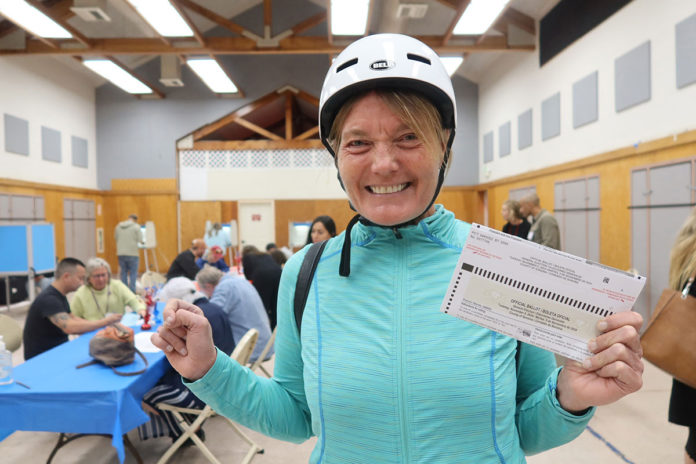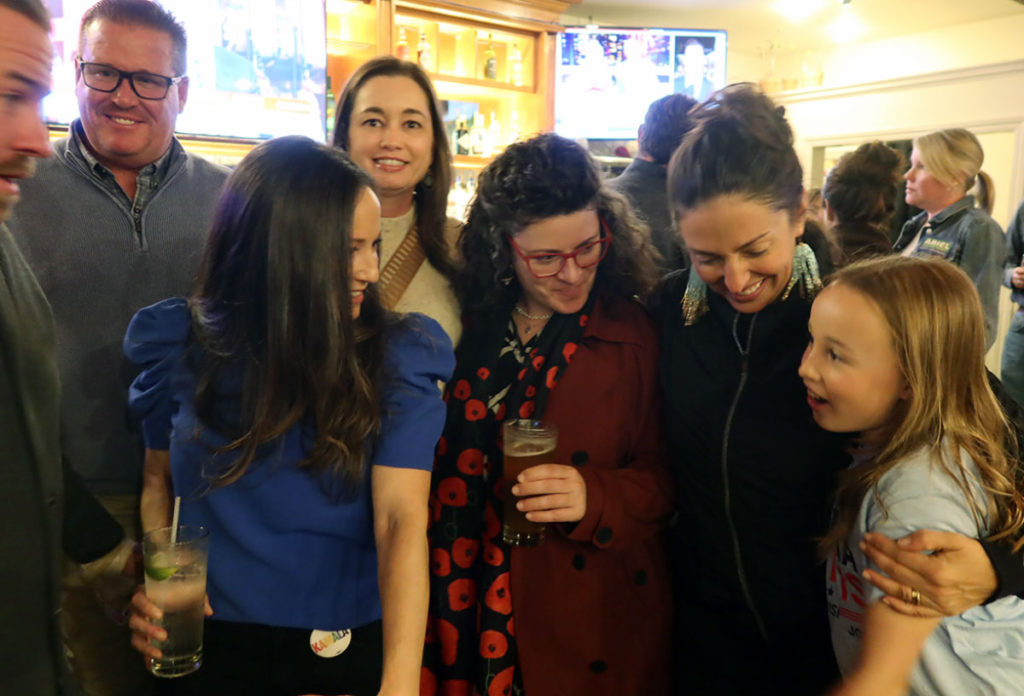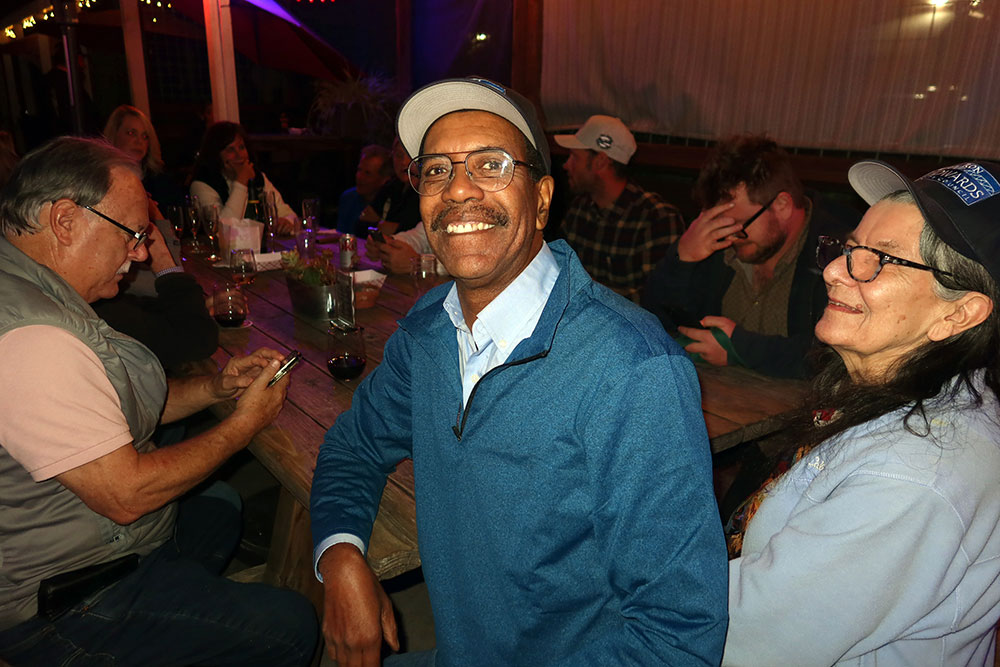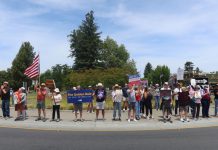
On Tuesday night, four of the five residents on the ballot for the Healdsburg City Council whiled away the after-dinner hours downtown, waiting for the results of the day’s general election. Although newcomer Heather Hannan-Kramer was nowhere to be found, Ariel Kelley and her extended family at Healdsburg Bar and Grill, and David Hagele and Ron Edwards with their entourages at the Elephant in the Room, had their own worries in mind.

It was after 8:30pm that the first results of the election came in from Sonoma County Registrar of Voters, and the short read was that the three incumbents—Kelley (2,186 votes as of 2am the next morning), Hagele (2,095) and Edwards (2,219)—had been re-elected to the council seats. A cheer went up at the Elephant outside table, followed by a toast to Edwards, who early in the count had won the most votes of the three.
Repeating an adage of local political candidates, Hagele said, “Walk, knock, and win.” Edwards for the past two cycles has made it a point to knock on every door in Healdsburg, and once again it paid off. The other candidates all did their share of walking, but none approached Edwards’ diligence (or step-count).
Shortly thereafter Linda Cade, the fifth candidate (995 votes), dropped by as well. Hannan-Kramer (also out of the running at 1,321) never did make it, presumably dealing with a parental obligation for one or both of her two children.
The Shenkman Letter
But all candidates shared the awareness that this was the last election of its kind, a city-wide free-for-all where the top three finishers, or two depending on the year, could claim victory. In late September a letter had arrived by Certified Mail, addressed to City Clerk Raina Allan, from the law firm of Shenkman & Hughes—the dread “Shenkman Letter” that so many cities in California have received over the last few years.
Since 2016, the firm has sent letters to jurisdictions all over the state, demanding they adhere to a tight reading of the California Voting Rights Act of 2001, which requires elections to reflect the demographics of the jurisdiction that holds them. So a city like Healdsburg, which elects five council members as a city should instead elect them by district, and should instead divide up its 4.1 square miles of geography into five districts.

After the first few cities to contest Shenkman’s letter failed in the courts, at great legal expense, most cities acquiesced without a fight, though not without injury—Shenkman demands $30,000 to prevent a lawsuit, and usually gets it. As of a year ago the law firm had successfully extorted 151 jurisdictions in the state, and now it’s Healdsburg’s turn.
It will be a lengthy and contentious process to carve Healdsburg into five districts, but it’s inevitable. The first public airing of this challenge will be at the next City Council meeting, on Nov. 18.
Other Races
The council members knew theirs wasn’t the only race on the ballot. The highly-contested Measure O, to exclude the downtown area from the city’s long-standing Growth Management Ordinance to permit multi-unit housing, had lost by a firm 60-40 split. This despite a concentrated and expensive push by the city, including members of the council acting individually, to sell voters on the plan.
Measure R, a school district bond initiative, was passing with 63% though only 55% was needed for the voters’ approval. It authorizes $49.5 million in bonds for school deferred maintenance, improvements and construction. At the same time, voters filled three seats on the Healdsburg Unified School District Board of Trustees—incumbent Rose McAllister, and former trustees Donna Del Rey and Judy Velasquez.
Measure W, the county-wide measure to continue the 1/8-cent sales tax to support library services, was right at the 67% margin it needed to pass.

Measure J, the county-wide effort to control CAFOs (Concentrated Animal Feeding Operations), was soundly defeated 85% to 15% following a full-court press campaign against it by the Sonoma County Farm Bureau and other business interests. Healdsburg was one of a half-dozen cities that voted its opposition to the measure as well.
Measure I, a county-wide sales tax of 1/4-cent for childcare and health services, was comfortably above its 50% threshold with 61%.
But as these votes were slowly revealed and absorbed at Healdsburg Bar and Grill, the Kelley family festivities continued despite a studied aversion to looking at the big screens behind the bar that continued to drizzle out the national news, in red and white and blue and red, red, red, as if shying away from the outside world. It would come knocking on all our doors soon enough.









People in Healdsburg love to tax themselves. Well, most of them can afford it. Maybe our town should change its name to “Milagro.”
Why not abolish the city council and avoid paying the $30k to the lawsuit extortionists while also dividing up the city into five districts? Does Healdsburg need a city council?
Timmy Taes—and others who are too dim to get it: It is a State Law under which the dreaded “Malibu Lawyer” pursues his cases. For reasons which should be obvious, he has never lost a case. But at least the people who run the Burg of Healdsburg are a bit baiter than, say, Palmdale, where it would have cost $100,000 to convert to District Elections, but they fought the case, lost, and paid $4 Million in court costs.
Why does every mention of these cases seemingly require that Shenkman be described as from Malibu.
Final question: Why not contact him and repeat your accusation of “extortion “?
PS: I didn’t see any Harris/Walz yard signs this year. There were plenty of Biden/Harris signs in 2020. Of course, there are never any Trump signs. Very dangerous that. Also, no fireworks after the election result was declared. In 2020, there were people setting off fireworks. My friend in Los Angeles also had the same experience in 2020 and then it was quiet in 2024. I suppose the Trump supporters in our area just had a quiet drink.